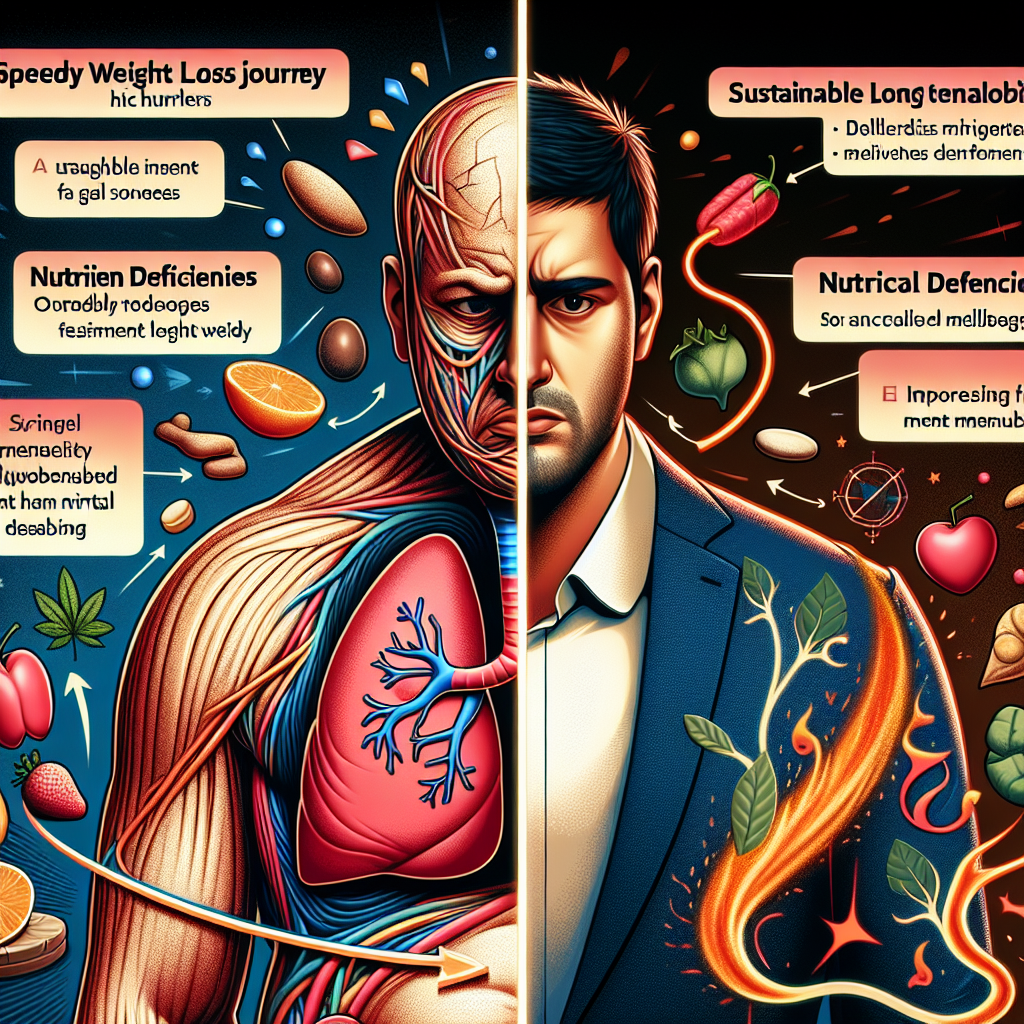The Health Risks of Rapid Weight Loss and the Benefits of Gradual Weight Loss
Strap in tight, as we’re about to navigate through the lanes of weight loss, highlighting the perilous detours of rapid weight loss and shining a spotlight on the scenic route of gradual, healthier weight reduction. The emphasis is laid firmly on the alarming health repercussions of hastily shedding those pounds, deterring you from mistaking your body weight as the sole yardstick of your overall health. As advised by the experts, you are better off losing around half a kilos in a week, totaling to about 2 kilos in a month. Aiming for this reduction number comes with an action plan of implementing a calorie deficit diet, regular physical exercise regimen, and adopting healthier eating habits. You’ll learn why going beyond that slimming pace could escalate into a strain on your bodily functions and internal organs, and induce a gamut of discomforts like fatigue, lethargy, and even nausea. Finally, we’ll stress how your weight loss journey should enhance your energy levels and boost your overall health perception.

Understanding Rapid Weight Loss
Definition of rapid weight loss
rapid weight loss refers to the process of losing a substantial amount of weight in a short period. It’s typically characterized by the loss of more than 2 kilos per week. As appealing as the results might sound, the methods typically employed to achieve this sort of weight loss are often extreme and can lead to significant health risks.
Common methods of rapid weight loss
There are myriad methods that individuals turn to for rapid weight loss. These often include intensive physical training, drastically reducing caloric intake, using laxatives, adhering to ‘fad’ diets, or even fasting. While these methods might produce immediate results, they are neither sustainable nor healthy in the long term.
Perception and societal pressure towards rapid weight loss
Societal expectations and pressures concerning body image often fuel the desire for rapid weight loss. Many individuals feel compelled to lose weight quickly due to the perception that a slim figure equates to attractiveness and general wellbeing. However, this perception can lead to dangerous health practices and psychological stress.
Health Risks Associated with Rapid Weight Loss
Impacts on metabolic functions
Rapid weight loss can inflict serious harm to your body’s metabolic functions. When you lose weight quickly, your body, in a bid to conserve energy, may slow down your metabolism, which, contrary to your goals, makes it more difficult for you to lose weight.
Risk of dehydration
Many rapid weight loss methods, especially those that involve reducing fluid intake or using diuretics, can lead to dehydration. Not only does this impair physical performance, but severe dehydration can also adversely affect kidney function.
Effect on the cardiovascular system
In your journey towards rapid weight loss, you might unknowingly put strain on your cardiovascular system. Rapid weight loss can lead to a decrease in blood volume, causing your heart to work harder to pump blood, which in severe cases can lead to heart palpitations or cardiac stress.
Implications for kidney health
losing weight too rapidly can lead to kidney stones or even kidney failure. When the body does not receive enough calories, it starts to break down muscle to use for energy, which can increase the amount of uric acid in the body that the kidneys must filter out.
Induction of fatigue and weakness
Think of your body as a machine. If it doesn’t receive adequate fuel (in this case, nourishment), it won’t function properly. Rapid weight loss often implies a significant reduction in calorie and nutrient intake which can lead to feelings of fatigue, dizziness, and overall weakness.
Rapid weight loss and mental health
Rapid weight loss can significantly impact mental health. People may experience mood swings, feelings of frustration, or even fall into depression. Additionally, individuals may develop an unhealthy obsession with maintaining a certain weight, which could lead to disorders such as anorexia or bulimia.
Science behind Gradual Weight Loss
Definition of gradual weight loss
Gradual weight loss refers to the process of losing weight slowly over an extended period. Professionals generally consider loss of 0.5 to 2 kilos per month as a healthy rate of weight loss.
Science behind achieving gradual weight loss
Gradual weight loss mainly relies on creating a calorie deficit, meaning you burn more calories than you consume. This doesn’t only mean monitoring your food intake but also incorporating physical activities in your routine. Over time, as you consistently burn more energy than you consume, the body begins to utilize stored fat, leading to weight loss.
Role of physical activity in weight loss
Physical activity is crucial to losing weight and maintaining weight loss. Exercise helps increase the number of calories your body uses, which in turn helps create the calorie deficit needed for weight loss. It also aids in increasing lean muscle mass which boosts metabolic rate.
Importance of calorie deficit in weight control
Creating a calorie deficit doesn’t necessarily mean consuming less food, but rather emphasizing healthier, more nutritious options that can keep you feeling full for longer. It’s a more manageable approach, since extreme calorie restriction can lead to muscle loss and nutritional deficiencies.
Benefits of Gradual Weight Loss
Long-term weight maintenance
Usually, those who lose weight gradually are more likely to keep it off in the long term. Rapid weight loss, on the other hand, can result in a ‘yo-yo’ effect, where the weight is quickly regained, leading to a cycle of weight loss and gain.
Reduced risk of metabolic syndrome
Gradual weight loss can also reduce the risk of developing metabolic syndrome – a cluster of conditions that occur together, increasing your risk of heart disease, stroke, and type 2 diabetes.
Increased levels of energy
Slow and steady weight loss can increase your energy levels. This is because a balanced diet combined with regular exercise results in a better metabolic rate and improved muscle strength.
Promotion of general well-being and health
Gradual weight loss can enhance the overall quality of your life, as it encourages a balanced diet, regular physical activity, and an overall healthier lifestyle.

Creating a Healthy Weight Loss Plan
Setting realistic weight loss goals
One of the first steps in creating a healthy weight loss plan is setting realistic, achievable goals. These goals should be specific, measurable and time-bound, but most importantly, they should be based on your personal health and lifestyle considerations.
Choosing a healthy diet
When it comes to weight loss, diet indeed makes up a large part of the equation. This doesn’t mean starving yourself, but rather opting for a balanced diet that is rich in protein, fiber, and healthy fats, while being low in sugar and unhealthy fats.
Including regular physical activity
Consistent exercise is key to maintaining your health and aiding in your weight loss goals. It is advisable to include a mix of aerobic exercises, strength training, and flexibility exercises in your routine.
Including healthy lifestyle changes
Developing healthy habits goes beyond your diet and exercise routine. It’s also about getting enough rest, reducing stress, and adopting a positive attitude towards your body and weight loss journey.
Role of Professionals in Weight Loss Journey
How can professionals help in weight loss?
Professionals, like dietitians, psychologists, trainers, can provide guidance and support throughout your weight loss journey. They can create personalized strategies for you and help you stay motivated and accountable to your goals.
Importance of regular health check-ups
Regular health check-ups are essential to monitor your progress and ensure that your weight loss methods are safe and effective.
Role of nutritionists and dieticians
Nutritionists and dieticians specialize in designing personalized eating plans based on an individual’s lifestyle, preferences, and health needs. They can teach you about nutrition and help you make healthier food choices.
Seeking help from physical trainers
Physical trainers can conduct fitness assessments and design exercise routines that suit your needs and preferences. They can also provide motivation and guidance during your workouts.

Societal Influence on Weight Loss
Societal pressures and weight loss
In many societies, thinness is often equated with attractiveness, success, and happiness. This perception can lead individuals to adopt unhealthy methods to lose weight rapidly.
Impact of media on weight loss ideals
Media portrayal of the ‘ideal’ body size and shape can influence societal views on body image and contribute to the pressure to lose weight.
Importance of cultural competence in weight loss
Understanding and respecting different cultural practices and beliefs about food and body image can contribute to a healthier approach to weight loss.
Striving for a body-positive society
Promoting body positivity encourages individuals to respect and appreciate all body types and contributes to a healthier society. It’s important to remember that health comes in many sizes and shapes.
Common Myths about Weight Loss
Demystifying fad diets
Fad diets, often promoted for quick weight loss, are usually not sustainable and can be harmful to your health. It’s crucial to follow a balanced diet for healthy and sustainable weight loss.
Debunking exercise myths
While exercise is crucial for health and weight loss, it’s not the only factor. Diet also plays a significant role. Similarly, it’s not necessary to exercise to exhaustion; moderate levels of regular activity can also aid weight loss.
Refuting quick fat-loss products
Many products promise quick fat loss, but many are not scientifically proven and can come with adverse side effects.
Reality about weight loss supplements and pills
Weight loss supplements and pills rarely lead to sustainable weight loss and could carry significant health risks. It’s always better to rely on a healthy diet and regular exercise.

Psychological Aspect of Weight Loss
Understanding the impact of weight loss on mental health
Weight loss, especially rapid weight loss, can impact your mental health. This could result in eating disorders, depression, and body dysmorphia. It’s crucial to maintain a balanced approach to weight loss and body image.
Effects of rapid weight loss on self-esteem
Though some might experience an initial boost in self-esteem with rapid weight loss, this is often short-lived, especially if the weight loss is not sustainable. The resultant weight gain can have a negative effect on self-esteem and body image.
Weight loss and body imaging
Rapid weight loss often involves unrealistic body image goals. It’s important to love and accept your body as it is, and any decision to lose weight should be from a place of self-care and health, not self-loathing or societal pressure.
Managing expectations and staying motivated during weight loss
It’s crucial to manage your expectations when embarking on a weight loss journey. The process takes time and requires consistency, patience, and resilience. It’s equally important to stay motivated and keep reminding yourself why you started this journey in the first place.
Conclusion and Recommendations
Final thoughts on rapid versus gradual weight loss
While rapid weight loss might seem tempting, it comes with significant health and psychological risks. Gradual weight loss proves to be the more beneficial and sustainable option. Remember, weight loss is a journey, not a race.
Recommendations for healthy weight loss
Adopt a holistic approach to weight loss, encouraging a balanced diet, regular exercise, and a positive mindset. Enlist the support of professionals to guide you through your weight loss journey.
Encouraging gradual weight loss over rapid weight loss
Remember that everyone’s weight loss journey looks different. It’s not about comparing your progress with someone else’s. Instead, focus on gradual, consistent changes that promote overall wellbeing and long-term health benefits.



Pingback: Sustainable Weight Loss: Focused On Healthy Changes, Caloric Deficit And Exercise
Pingback: Uncovering What Vitamins Aid In Quick Weight Loss